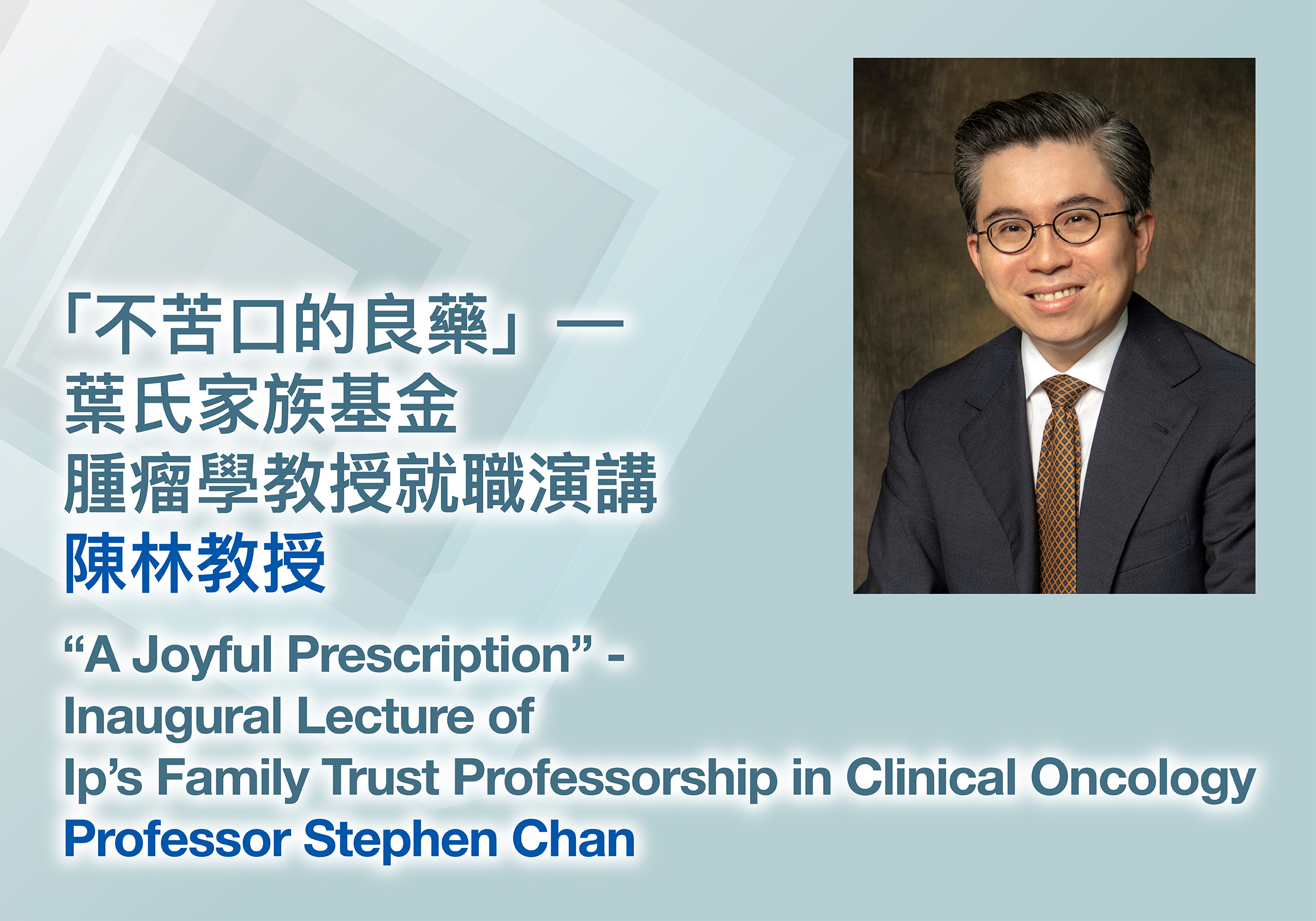Events
“A Joyful Prescription” by Professor Stephen Chan – Inaugural Lecture of Ip’s Family Trust Professorship in Clinical Oncology
18 Aug 2022
5:00 pm
Kai Chong Tong, G/F, The Jockey Club School of Public Health and Primary Care / Faculty of Medicine Postgraduate Education Centre, Prince of Wales Hospital, Shatin, New Territories
(The registration for attending the lecture on-site is FULL. The lecture is also open for online viewing via ZOOM platform.)
Professor Stephen Chan
MBBS (HK), MD (CUHK), FRCP (Edin), FRCP (Lond), FHKCP, FHKAM (Medicine)
Professor Stephen Chan was born in 1976. Inspired by his teacher and personal experience in hospital-stay, he had determined to be a medical doctor since Form 6 at secondary school. Professor Chan graduated from the University of Hong Kong in 2000 and received postgraduate training on Medical Oncology in the Prince of Wales Hospital from 2001 to 2007. He joined the Chinese University of Hong Kong in 2008 as Clinical Assistant Professor, becoming Clinical Associate Professor in 2014 and Clinical Professor in 2021, followed by being appointed as Assistant Dean (Health Systems) in 2021. Professor Chan’s focus of research is clinical and translation research in hepatobiliary-pancreatic cancers. He has more than 160 peer-reviewed papers and delivered over 100 international lectures. Professor Chan has been awarded the Gold Medal Prize for his dissertation in 2007 and Young Investigator Award for his research works in 2008 by the Hong Kong College of Physician. Internationally, Professor Chan is serving as Chairman of Education Committee at the International Liver Cancer Association and an overseas member of the Hepatobiliary Task Force of National Cancer Institute in the United States. He has also served in Scientific Steering Committee of the European Society for Medical Oncology Congress as a track chair in 2021 and committee member from 2022-2023. Professor Chan has been invited to be Associate Editors in a number of journals including Journal of Hepatology, Liver Cancer, and Therapeutic Advances in Medical Oncology. Locally, Professor Chan is serving in Biology and Medicine Panel for the General Research Fund, Hong Kong. In 2015, he has founded a charity known as Hand in Hand Cancer Foundation to provide free service and education for cancer patients.
Professor Chan is married to Dr Rachel Cheng, with a daughter Chloe.
Please click here for online registration.
3943 8893
Cancers arisen from the liver, bile duct or pancreas (HBP cancers) share unique anatomy and clinical features. Due to its complexity, most HBP cancers are nowadays managed by specialized multidisciplinary team in experienced centres. Patients with HBP cancers frequently have impairment of organ function, including cirrhosis, biliary obstruction and pancreatic insufficiency etc. As a result, sufferers of HBP cancers are more susceptible to the side effect of anti-cancer treatment as compared to other cancers. Those complications not only limit the anti-cancer efficacy but also induce significant physical and psychological burdens to patients. When I started pursuing oncology career, it has been my dream to discover better treatments to enhance both the life-expectancy and quality of life of HBP cancer patients. Over the past 20 years, our research group has spent concerted efforts to test different novel treatment modalities on HBP cancers. For examples, in Jan 2022, our group has led an international clinical trial to establish a regimen with combination of immunotherapeutics for liver cancer. This regimen could remarkably extend the survival of patients while keeping them from the troubles of conventional treatment. To further improve the outcome of patients with HBP cancers, our group has recently started working on the strategy of personalizing cancer treatment with predictive biomarker and organoid drug testing. Under this concept, different individual patient will undergo specific treatment to maximize the efficacy/toxicity ratio according to drug testing results. Our pre-clinical models and early clinical experiences have already shown promising results. To put into clinical practice, our research team is planning to commence a large-scale clinical trial testing the concept of personalized treatment in HBP cancers.




